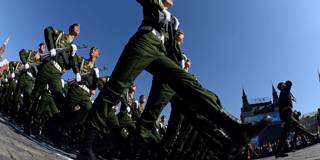In this commentary from January 5, 2015, the last Soviet president, Mikhail Gorbachev, warned that the world “is on the brink of Cold War II. Some even say that it has already begun.” He was right. The previous year, Russia had annexed Crimea from Ukraine and the West had imposed sanctions against the Kremlin. We now know that relations between Russia and the United States (and the West collectively) would continue to deteriorate. With Russia launching a full-scale war in Ukraine, and with Western sanctions rising to the level of “weapons of economic destruction,” we have gone well beyond the Cold War. We stand on the brink of World War III. Some even say that it has already begun.
Gorbachev lost his job as the Soviet president when the USSR collapsed in 1991. He believes that many current security problems can be traced back to the US’ active declaration of victory in the 1990s, when it sought to impose its will on the European and global security architecture without accounting fully for its partners’ interests. Without excusing Russia’s war of aggression in Ukraine, it is still hard to disagree with Gorbachev’s basic assessment. He reminds us that “the international situation” in the 1980s “was no less dangerous than it is today,” yet it was “ameliorated” through dialogue.
It is unfortunate that the world didn’t heed his advice. Though some negotiations took place before Russian President Vladimir Putin ordered his “special military operation” on February 24, 2022, the participants in that dialogue lacked “the ability to interact, listen to, and hear one another.” In Gorbachev’s view, these are necessary preconditions for talks – and thus for peace. – Nina L. Khrushcheva, Spring 2022
MOSCOW – As 2014 comes to a close, it is clear that the European and international political structures that have been in place since 1989 have failed the test of time. Indeed, the world has not witnessed such a tense and fraught environment since the Cold War’s end, with bloodshed in Europe and the Middle East coming against the backdrop of a breakdown in dialogue between major powers. The world, it appears, is on the brink of Cold War II. Some even say that it has already begun.
Meanwhile, the world’s key international body – the United Nations Security Council – is scarcely playing a role or taking concrete action to stop the fires and the killing. Why has it not acted with determination to evaluate the situation and develop a program of joint action?
One primary reason, I believe, is that the trust created by hard work and mutual effort in ending the Cold War has collapsed. Without such trust, peaceful international relations in today’s globalized world are inconceivable.



Gorbachev lost his job as the Soviet president when the USSR collapsed in 1991. He believes that many current security problems can be traced back to the US’ active declaration of victory in the 1990s, when it sought to impose its will on the European and global security architecture without accounting fully for its partners’ interests. Without excusing Russia’s war of aggression in Ukraine, it is still hard to disagree with Gorbachev’s basic assessment. He reminds us that “the international situation” in the 1980s “was no less dangerous than it is today,” yet it was “ameliorated” through dialogue.
It is unfortunate that the world didn’t heed his advice. Though some negotiations took place before Russian President Vladimir Putin ordered his “special military operation” on February 24, 2022, the participants in that dialogue lacked “the ability to interact, listen to, and hear one another.” In Gorbachev’s view, these are necessary preconditions for talks – and thus for peace. – Nina L. Khrushcheva, Spring 2022
MOSCOW – As 2014 comes to a close, it is clear that the European and international political structures that have been in place since 1989 have failed the test of time. Indeed, the world has not witnessed such a tense and fraught environment since the Cold War’s end, with bloodshed in Europe and the Middle East coming against the backdrop of a breakdown in dialogue between major powers. The world, it appears, is on the brink of Cold War II. Some even say that it has already begun.
Meanwhile, the world’s key international body – the United Nations Security Council – is scarcely playing a role or taking concrete action to stop the fires and the killing. Why has it not acted with determination to evaluate the situation and develop a program of joint action?
One primary reason, I believe, is that the trust created by hard work and mutual effort in ending the Cold War has collapsed. Without such trust, peaceful international relations in today’s globalized world are inconceivable.